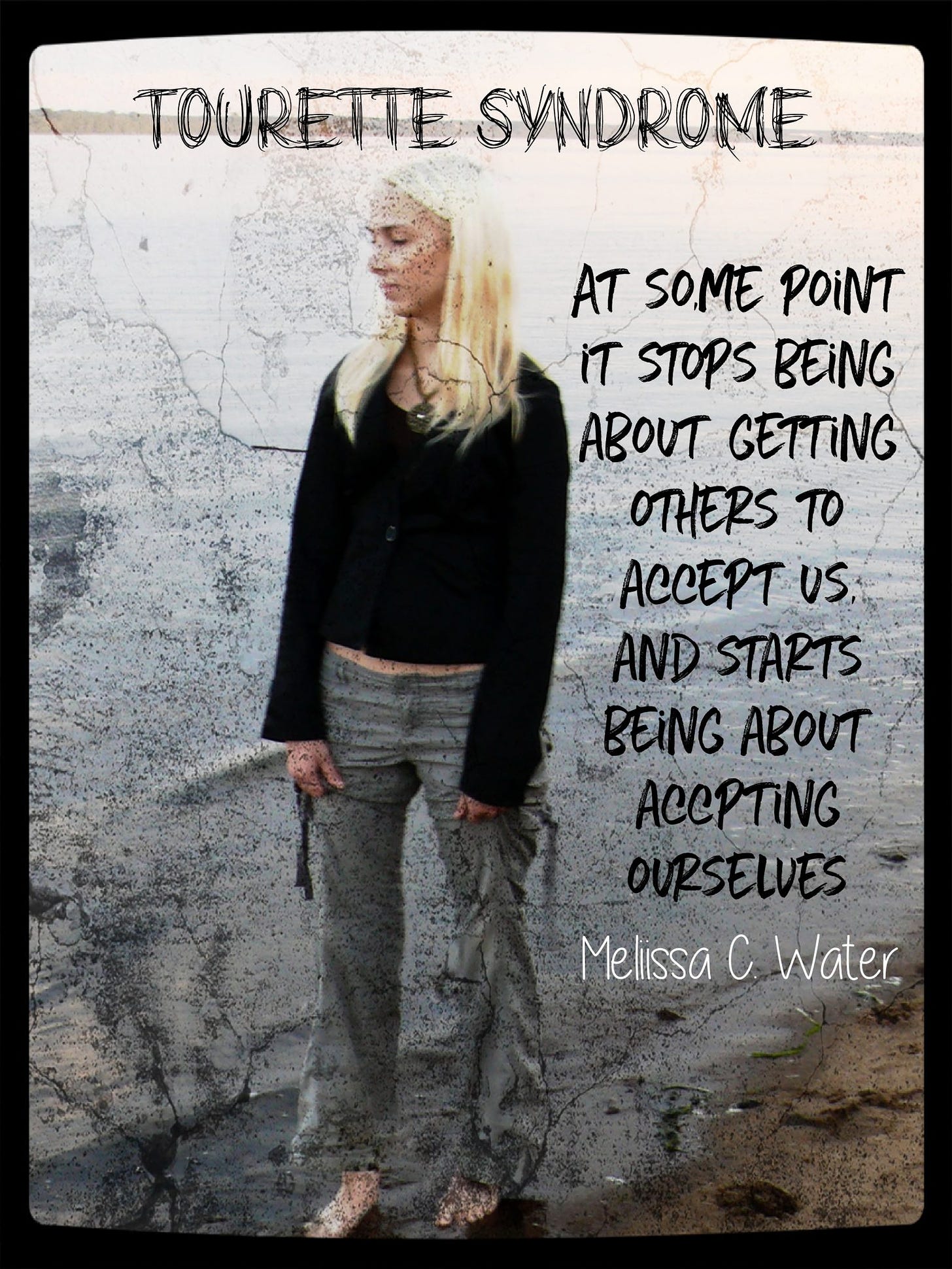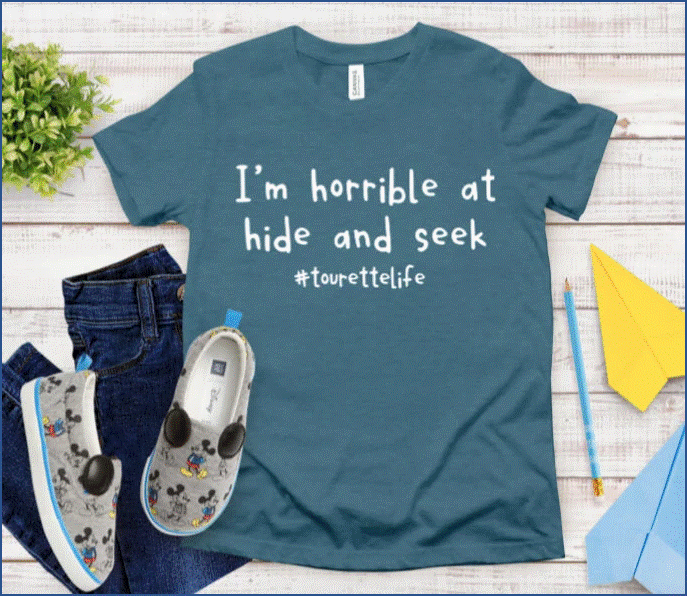I have a neurological condition called ‘Tourette syndrome’, which is named after the French neurologist who first described it. Although a definitive cause is not known, it is possible that it is an autoimmune-mediated disorder. Having Tourette syndrome means my body can make sounds and movements that are against my will. These are called ‘tics’ (not the kinds of ‘ticks’ that can spread the causative agents of diseases like Lyme disease). Some people have one to a few permanent tics; this is not Tourette’s. Tourette syndrome is characterized by an array of tics that will change over time, with some disappearing and then reappearing over the years.
I do not have coprolalia, which can include uncontrolled swearing and other socially inappropriate verbal outbursts. Although often misunderstood to be a hallmark of Tourette syndrome and popularized in movies like What About Bob, only a minority of people with this diagnosis have coprolalia. By the way, I loved the movie “What About Bob”. I laugh at well-intentioned humour, including that poking fun about Tourette syndrome.
If someone does not have a tic, the best way to understand them is to think about not blinking. You can prevent yourself from blinking for a period of time, but eventually the urge builds to the point where you can no longer stop it from happening. This is what having tics is like. The part of my brain that would normally censor unwanted vocalizations and movements doesn’t work as efficiently as it does in others.
Having Tourette syndrome can lead to awkward social scenarios. For example, having a tic in which one forcefully snorts air out of their nose can be a challenge when one has a stuffy nose. I speak from experience as this embarrassing combination happened to me once in the middle of a conversation with a friend from school. Bless their soul, they acted like they didn’t notice, although their eyes did dramatically widen momentarily. Ever since, I have blown my nose prior to public engagements and carry a Kleenex in my pocket. Playing games like hide-and-seek can be challenging when dealing with vocal tics.
I was formally diagnosed by a neurologist when I was seventeen years old, but have been dealing with Tourette syndrome since I was about seven. I credit my aunt for helping everyone figure out what had been happening to me. She was watching an episode of LA Law that featured a lawyer examining a person with Tourette syndrome. She immediately recognized me in this character and called my Mom. This led to my diagnosis. I finally had confirmation that I was not crazy.
Even after my diagnosis, I was embarrassed about having Tourette syndrome. It caused people to stare at me and ask what was wrong with me. Sometimes people would get up and move far from me in public settings because they would be disturbed by my tics. When asked, I usually told people that I had a cold. A lot of my tics mimic the signs of a cold, including clearing my throat, sniffing, snorting, and coughing. Numerous times people would offer me a tissue with kind intentions and they would be a bit confused when I would simply fold it up and place it in my pocket to serve as a back-up to my other one.
I remember one time when a fellow graduate student responded to my claim to have a cold by stating that I should see a doctor because I had apparently been suffering from the same cold for two consecutive years. My attempts to hide the fact that I had Tourette syndrome largely stemmed from being teased about it when I was growing up as a child and young teenager. Social isolation on the playground makes one a prime target for bullies and there was one bully who was relentless with me for many years. Overall, these experiences resulted in me adopting a largely introverted personality during my formative years.
It wasn’t until well into my graduate program at university that I finally became comfortable with my diagnosis and began openly discussing it with people and viewing it as providing many teachable moments. I have long-accepted that Tourette syndrome is a key part of who I am. Whenever I have a new class to teach at my university I usually have a discussion with the students about Tourette syndrome. I have found all my students to be very accepting of this.
I still get frustrated sometimes when people make wrong assumptions about my tics. As one example, while listening to a presentation at a scientific conference, I had a fellow professor who was sitting in front of me turn around and glare angrily while telling me to use the tissue they were offering me to blow my nose and be quiet. After neatly folding her Kleenex and carefully placing it in my pocket I leaned forward, thanked her, and indicated that she would have to find a cure for Tourette syndrome if I were to have a fighting chance at stopping my sniffing. There was no apology, but also no further anger directed my way. We all misjudge others at times.
When looking back, I appreciate that having Tourette syndrome has actually been a blessing to me in many ways. For example, it taught me to be more appreciative and accepting of others with differences. It made me less judgmental and more empathetic; I usually don’t jump to conclusions about people’s behaviours as quickly. It helped me identify true friends who value the person and don’t care about the syndrome. It allowed me to build some resiliency. Interestingly, having a condition that did not allow me to comfortably fit into a lot of social contexts resulted in me becoming quite resistant to peer pressure. I had no choice but to be different and I became comfortable with that.
I wouldn’t exactly say that I view Tourette syndrome as some kind of gift, but it has been important in shaping me into the person that I am. I no longer worry too much about what people think of my tics. It is what it is and I just focus on what I can control in my life.
Two of the Hardest Things About Having Tourette Syndrome
Two things about Tourette syndrome that people without it cannot truly appreciate is how utterly exhausting it is and how physically uncomfortable it can be.
My body requires a vast amount of energy to manifest its wondrous array of tics on a non-stop basis throughout the day. To resist the tics seems to consume even more energy. And the tics get worse during ‘time alone’ breaks as their build-up in public scenarios gets released. These are times when most people can rest and recover during the day. As a result, I tire earlier in the day than most people and need to sleep A LOT. I love naps. Sleep is the only time that I am free from my tics.
The repetitiveness of certain tics can damage the body. Some of my tics cause me to routinely tear muscles and sometimes strain tendons. For a while now, I’ve had tics that cause me to hyperextend my jaw and twist my neck. The result is that the joints of my jaw and cervical vertebrae are often very sore and ‘crack’ (like when one cracks their knuckles).
Tourette’s and COVID-19 Lockdowns
Some aspects of the COVID-19 lockdowns caused particular distress for some of us with Tourette syndrome. Take the preponderance of Zoom meetings. To have people’s attention focused solely on your face, often enlarged on a screen, can be a bit off-putting when one has lots of facial tics. And it presents an opportunity for people to stare in the absence of the usual social cues that might indicate the inappropriateness of doing so. Also, placing a microphone in front of a person with vocal tics can sometimes result in unexpected and surprisingly jarring ‘sound effects’.
I can tell you that going to public places, such as the grocery store, often proved to be an interesting experience. Think about how everyone who had signs of illness were to remain isolated. All sick people were to be feared as bringers of death. So, I would receive many cold glares from people who were convinced that I must be sick and breaking quarantine. Even though I normally wouldn’t worry too much about what others think, a lot of people got pretty worked up over the past couple of years, with some adopting an attitude that they should take enforcement of policies into their own hands. So I always felt compelled to keep a lookout for the COVID zealots.
If anyone has seen any of my video interviews, my tics are obvious. Consequently, I tend to not like watching my own interviews. I have always been somewhat uncomfortable in front of a video camera and in a public speaking setting. However, my job has helped me to appreciate these venues as opportunities to share the expertise that I invested many years into building. Notably, taxpayers subsidized most of my education and they pay for much of my academic institution’s operating budget, including my salary. From this perspective, I am more than happy to return the favour by answering questions that the public have as long as they fall into my scope of expertise. I’ll never win an academy award, but I can get truthful scientific information to a lot of people.
COVID-19 Lockdowns and Sudden Appearance of Tic-Like Behaviours
Something very unusual seems to have been triggered around the world by the harsh social lockdowns. It has been described as ‘rapid onset functional tic-like behaviors’. It is not Tourette syndrome but is something quite similar. Unlike Tourette’s, which preferentially affects males and starts early in life, rapid onset functional tic-like behaviours has mainly been diagnosed in teenage girls and young women. It can appear very suddenly, even overnight. And some of the tics can be very aggressive, causing acute harm to both the individual and those around them; this is usually not the case for Tourette’s. A video providing more detail can be viewed here.
Although it is not Tourette syndrome, the issues that young people with rapid onset functional tic-like behaviors have had to deal with are similar.
Advocacy
Children have been the most mistreated demographic on earth for the last three years and for no good scientific reasons. In particular, I know of children with Tourette syndrome who have found the past few years to be a particularly difficult time for the many reasons I discussed above. Every person’s array of tics is different and they change over time, so many children with Tourette syndrome have been uniquely impacted. It is for this reason that I felt compelled to write this article. For the past several years, many of our government and public health officials, and far too many physicians failed miserably when it came to advocating for children. As someone with the expertise to see right through their unjustified claims to be following the science, I have been trying to do my part to stand up for our kids. In this article I chose to give a special shout-out to those with Tourette syndrome.
For young people struggling with a diagnosis of Tourette syndrome
A diagnosis can feel like a label that suggests you are somehow defective. But you are not a syndrome. You are a precious person; unique and special. And you happen to have a burden to carry. But most people have some kind of burden to carry, in many cases they are unseen. You must plot your own journey to finding self-acceptance. I encourage everyone with this syndrome to make it your goal to fully accept your condition and find pride in who you are. Surround yourself with people who see you and not your syndrome. Try not to worry too much about those who view your tics in negative ways. Many people irrationally fear differences, often unconsciously, and sometimes as misdirected attempts to deal with their own issues. Focus on what you can control. You are uniquely and wonderfully made. And you have a purpose in this life; one that only you can fulfill. And Tourette syndrome may turn out to play an important part in the journey that leads you to find that purpose.
Tourette Canada
For those without Tourette syndrome
Don’t assume that a person’s odd social behaviours are done with ill intent or due to being unthoughtful of those around them. First consider whether there may be a reasonable explanation. Try not to let chastisement or harsh judgement be the initial reaction. It is important that children with Tourette syndrome be provided with safe spaces and ready access to trusted individuals so they can feel comfortable enough to raise issues should they wish to.
If you meet somebody with Tourette syndrome, just treat them like you would anyone else. Tourette’s is not contagious. Nor is it something that should be feared. It is normal to be taken aback when initially exposed to some tics. They can create awkward social situations at times. But, like anything else, if you give a person with Tourette syndrome a chance, you will get comfortable with the tics and, over time, they will become less of a distraction to you. People are great at accommodating to new situations if they allow themselves time to do so.
…and if you ever become friends with someone with Tourette syndrome and want a sure-fire way to win a game against them, challenge them to a few rounds of hide-and-seek.







Beautiful article, thank you. My 75 year old dad has had lifelong Tourette with coprolalia . Thank you dr bridle for having the courage and moral fortitude to speak out. It was because of your interview about the Japanese biodistiribution study that I was able to make an informed decision to not get the jab as I was breastfeeding. I have come to think that you saved my life and that of my then infant son. God bless you.
That is beautifully written. Having fibromyalgia / chronic fatigue syndrome I can relate with much of what you said. We never know what challenges others may have. A little Patience, Acceptance, and Understanding go a long way, as does Love.